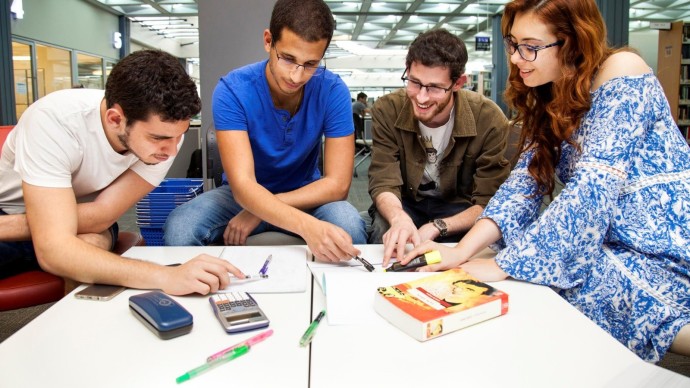“It is unrealistic to expect a student to focus exclusively on studies. In entrepreneurial work; you must deal with complex situations, difficulties, conflicts and the need to do a thousand and one things at the same time,” says Innoviz’s CEO, Omer Keilaf, a member of the Tel Aviv University (TAU) Alumni Organization.
“I had a good environment of people who came to learn, but at the same time worked, enjoyed life and did many other things.”
Innoviz is developing a technology called LiDAR that can produce a three-dimensional image in real time using cameras and sensors, which can be used in many industries, now primarily in the world of autonomous vehicles.
The company was established in 2016 by a group of IDF Technology Unit 81 alumni.
Among the founders is Keilaf, who completed – before, during and after his military service – a bachelor’s and master’s degree in electrical engineering and a bachelor’s degree in business administration, all at Tel Aviv University.
“I was in the Atudah program” – an IDF program that allows high school graduates to defer the draft and attend university before their military service, Keilaf recalls. “I wanted to study at Tel Aviv University because, in addition to the high level of study, I was looking for a social experience.

“What makes the institution unique is that they push you to do more things while studying,” he said. “Other universities are trying to attract you to the place so that you will live there and do just one thing – study. This explains why Tel Aviv University is the best place for entrepreneurship because part of the challenge for the entrepreneur is to know how to deal with many problems at the same time, rather than individually.”
“Other universities are trying to attract you to the place so that you will live there and do just one thing – study. This explains why Tel Aviv University is the best place for entrepreneurship because part of the challenge for the entrepreneur is to know how to deal with many problems at the same time, rather than individually.”
Omer Keilaf
INNOVIZ RECENTLY announced several major contracts with leading automakers around the world, including BMW and Volkswagen, which will use the company’s advanced laser radar technology in autonomous vehicles.
“Our laser scanner scans the environment and creates a three-dimensional image, accessible to the viewer from every possible angle – even an overhead view,” explains Keilaf. “That’s why this 3D model helps the vehicle understand where everything is in space in real time. It’s actually an optical radar based on a 3D camera.”
Keilaf says that their current goal is to support autonomous driving at levels 2 plus, 3 and 4, which is called high driving automation. “When people think of an autonomous vehicle, they imagine a robotic vehicle, which can travel independently from place to place. That will take some time,” he explained.
“Currently, the industry is focusing on more focused applications, like autonomous driving on a highway, which allows one to loosen the grip on the steering wheel, or autonomous shuttles for use on public transportation.
“In this way, you reduce the use of the application to a place where you can perform more tests,” Keilaf pointed out. “A highway is much simpler to control than an urban environment. There are no traffic lights or intersections, and autonomous use solves a problem for quite a few people who drive there every day.
Even when we think of an autonomous shuttle, these are buses that run on fixed routes, so one can repeatedly check that everything is in order. In both cases, you significantly reduce the unexpected, reduce risks, and can allow for a quick launch.”
New fleet of vehicles
NEXT YEAR, two of Innoviz’s customers will launch their new fleet of vehicles that incorporates the company’s innovative technology. Keilaf explained that they chose to cooperate with German car companies because they are known to be early adopters of new technologies.
“We’re getting a lot of positive momentum today,” the entrepreneur said. “Our goal is to play a significant role in the industry and to be in all the vehicles in the world.”
He emphasized that the technology they are developing applies to other areas such as security, heavy industry, agriculture and more. “There is an entire world of 3-D camera usage beyond autonomous vehicles. Our goal is to equip as many entrepreneurs and developers as possible with our technology.”
Keilaf and Innoviz stay in touch and collaborate with TAU even today. “We have received a warm hug from the university,” he said. “This is reflected in occasional encounters with students and young alumni and meetings related to entrepreneurship.
“We also conduct projects with them related to the world of research. The university has initiatives to promote development activities in the world of autonomous vehicles, and we are happy to help. We donated our sensors to them, and we meet with groups and answer questions; it is a connection that contributes to both sides.
There are highly qualified people here, and I have made connections with TAU alumni that have been beneficial. Any good connection is a shortcut to a problem you are trying to solve, and Tel Aviv University is a type of big and wide social network.”
TAU alumni
TAU has over 200,000 alumni, many of whom are top players and leaders in all sectors of Israel’s economy and society, holding key positions in law, hi-tech, hospitals, media, education, and of course, academia.
TAU Alumni Organization’s goal is to leverage the influence of its alumni as a force contributing to Israeli society and to strengthen the university’s global reputation.
It strives to serve TAU alumni by sharing knowledge, promoting professional networking and creating inspiring, valuable opportunities. The mission of the Tel Aviv University Alumni Organization is to form and cultivate a world-changing community.
Translated by Alan Rosenbaum
Written in cooperation with Tel Aviv University
